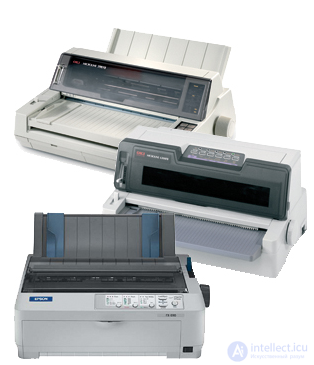Lecture
Matrix printers, sometimes called needle-like printers, are seriously inferior to inkjet printers and laser ones in terms of print quality. They are much noisier, since the printing mechanism is based on the percussion method (in different models, 9 or 24 percussion needles). Today, almost all such printers are monochrome, i.e. they allow printing in one color. But not everyone and not everywhere require photographic print quality. There are many practical applications where speed, simplicity and low cost of the printing process are much more important. And the durability and reliability of the printer are often more weighty than the possibility of printing in colored letters of printing quality. A well-known matrix printers possess a set of such qualities.
Another advantage of matrix printers is the ability to print on layered forms (printing at the same time up to 6 copies on sheets laid through copy paper). Expensive materials (paint, tape) are extremely cheap.
Epson has left the most visible mark on the global market for dot-matrix printers. Epson, which produces both inkjet and laser printers, reports that, oddly enough, but the demand for dot-matrix printers does not fall further.

It is expected that it will exist in the future as well, because there are places where you want to print documents and you need to immediately receive several copies - payment orders, tickets, invoices, invoices, stickers with addresses or bar codes and other financial, trade and warehouse documents
Comments
To leave a comment
History of computer technology and IT technology
Terms: History of computer technology and IT technology